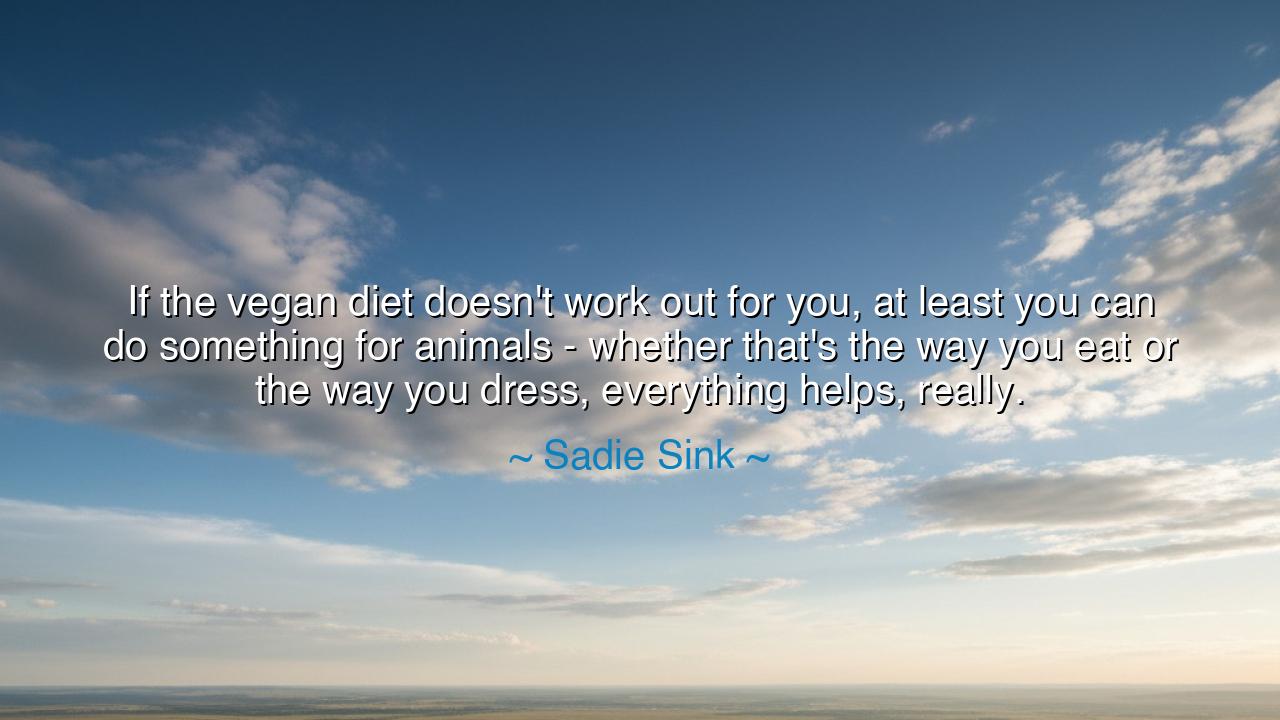
If the vegan diet doesn't work out for you, at least you can do
If the vegan diet doesn't work out for you, at least you can do something for animals - whether that's the way you eat or the way you dress, everything helps, really.






In the words of Sadie Sink, a voice of youthful conscience and quiet strength, we hear a truth both tender and resolute: “If the vegan diet doesn’t work out for you, at least you can do something for animals—whether that’s the way you eat or the way you dress, everything helps, really.” These are not words of judgment, but of compassion, spoken in a time when the earth groans under the weight of human desire. They call us to a gentler way of living—to an awareness of the lives intertwined with our own. Beneath her simple phrasing lies an ancient teaching: that every choice, however small, carries the power to heal or to harm, to take or to give.
Sadie’s message is a hymn to kindness and to intention. In an age of extremes, she speaks of balance—not demanding perfection, but urging conscious effort. She reminds us that virtue does not always roar; sometimes it whispers through daily habits, through the silent refusal to cause unnecessary suffering. Even if one cannot live entirely by the vegan way, she says, one can still live by its spirit—the spirit of mercy, gratitude, and mindfulness. Her words echo the wisdom of the ancients who taught that righteousness is not measured in grand gestures, but in the steady discipline of the heart.
The origin of her insight lies in the compassionate movement of our time—a reawakening of humanity’s bond with the natural world. Yet its essence is far older. The philosophers of Greece, such as Pythagoras, taught abstinence from animal flesh, believing that the soul of man was kin to the soul of every living thing. In the East, the sages of India and the monks of China practiced ahimsa, the principle of non-violence toward all beings. They understood, as Sadie does, that the way we treat animals reflects the depth of our humanity. To harm without need is to wound the harmony of creation itself.
Consider the tale of Saint Francis of Assisi, who, centuries ago, walked barefoot through forests, speaking softly to birds and beasts. He saw no barrier between himself and them, for he knew that all were made from the same breath of life. When his companions mocked his tenderness, he replied, “If you have men who will exclude any of God’s creatures from the shelter of compassion, you will have men who deal likewise with their fellow men.” Sadie Sink’s words arise from this same lineage of wisdom: that compassion is indivisible, and that to extend it to one being is to strengthen it for all.
What is profound in her statement is the freedom it offers. She does not speak as a zealot but as a guide. She does not demand that one must do everything—only that one must do something. In this humility lies her power. For change is not born of guilt, but of love. Every mindful act—choosing plant-based meals, refusing leather or fur, supporting cruelty-free products—becomes a step upon the path of healing. And in this way, even those who cannot walk the full journey can still walk with purpose.
Her words also remind us of an ancient moral truth: that progress begins not in perfection, but in intention. The smallest deed done with compassion outweighs the grandest ideal left unacted. The one who saves a single life, whether human or animal, participates in the quiet work of restoring the world. Like drops of rain that form the river, each choice—each gesture of kindness—joins a greater current that moves toward justice and renewal.
The lesson, then, is this: begin where you are. You need not be flawless to be good, nor pure to be kind. If the vegan path cannot be yours in full, take from it what you can—live with awareness, choose mercy when possible, and let gratitude guide your consumption. Every act of compassion, however modest, ripples outward beyond sight. Eat with reverence. Dress with mindfulness. Walk softly upon the earth. For the smallest kindness may yet turn the tide of cruelty.
And so, the wisdom of Sadie Sink becomes a beacon for all generations—a reminder that the measure of a life is not in what it consumes, but in what it spares. To live kindly is to live wisely; to act with compassion is to act in harmony with the eternal order. The ancients would have called such a soul temperate and just—one who honors the great chain of being that links all life together. May we, too, learn to live as she counsels: not perfectly, but consciously, until every act, every choice, becomes a quiet prayer for the world we share.






AAdministratorAdministrator
Welcome, honored guests. Please leave a comment, we will respond soon